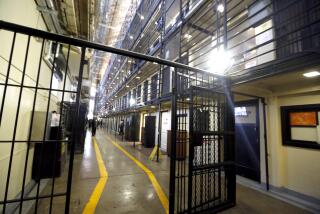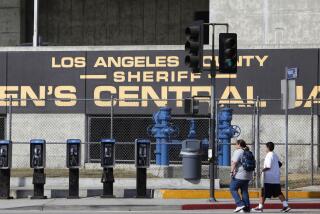California proposes isolation units for mentally ill prison inmates
To comply with federal court orders to improve the care of mentally ill inmates in solitary confinement, California proposes to create special isolation units that handle only those prisoners.
In the new units, mentally ill inmates would get extra time outside their isolation cells and have added access to treatment programs. Under policies previously submitted to the court, they also would be placed in isolation only if their treating clinician agreed.
The state’s solitary confinement cells -- called Security Housing Units -- are used for prisoners who commit new crimes while behind bars, break rules or are involved with gangs. Currently, only those with the most severe forms of mental illness are segregated in special psychiatric units.
California’s treatment of mentally ill prisoners has been controversial, and a federal judge in April ruled that the state violated those inmates’ rights by subjecting them to excessive punishment, including pepper spray and solitary confinement. Lawyers for inmates note that 11 of the 14 suicides in California prisons during the first seven months of this year occurred in isolation units, and 10 of those who died were mentally ill.
In Friday’s filing to U.S. District Judge Lawrence Karlton, the state proposes to create special segregation units for those with general forms of mental illness. Male prisoners in those units will be allowed out of their cells up to 20 hours a week, 15 for women. Both are substantial increases over what is currently allowed.
Karlton immediately issued an order accepting the new housing units, and commended the state and lawyers for inmates “for the substantial effort” behind those policy changes.
The state said it would also begin a case-by-case review of inmates currently serving lengthy isolation terms to see who might safely be returned to the general population. In a previous filing, the state proposed that those who are moved from solitary confinement to psychiatric units be screened before they can later be returned to isolation.
Corrections officials declined to elaborate on the new housing plan. “We are letting the filing speak for itself,” said agency spokeswoman Dana Simas.
In the filing, state lawyers say California guidelines exceed Karlton’s order to provide “treatment while in segregation.”
Michael Bien, one of the lead lawyers for inmates in the class-action lawsuit that led to Karlton’s ruling, described the new policy as “a substantial improvement,” with the benefit of having been designed by the state rather than the court.
“It is what they can do now, and make work,” Bien said.
The mental health and physical effects of California’s use of long-term solitary confinement is the subject of a separate class-action lawsuit.
Twitter: @paigestjohn
More to Read
Start your day right
Sign up for Essential California for news, features and recommendations from the L.A. Times and beyond in your inbox six days a week.
You may occasionally receive promotional content from the Los Angeles Times.







